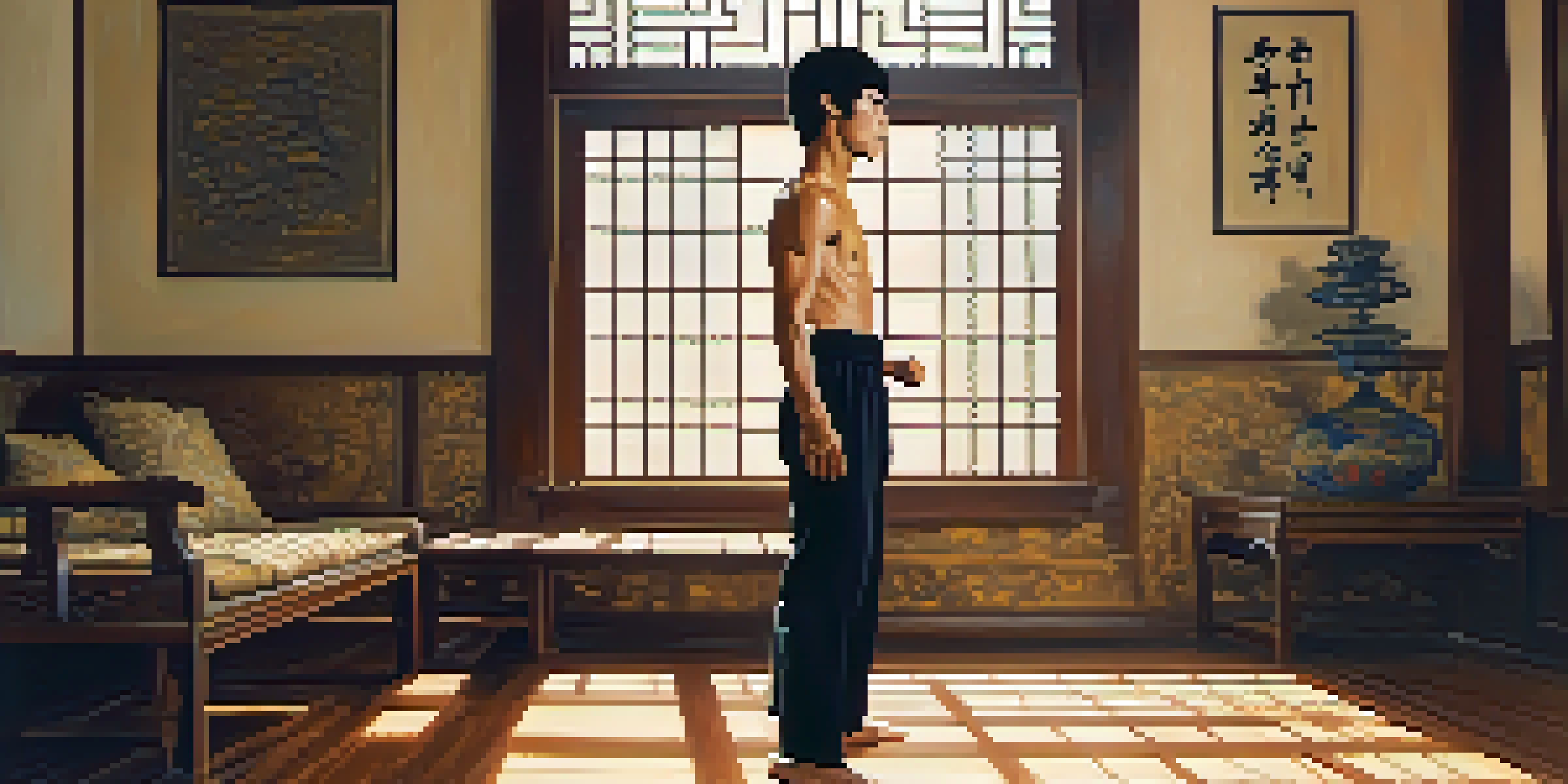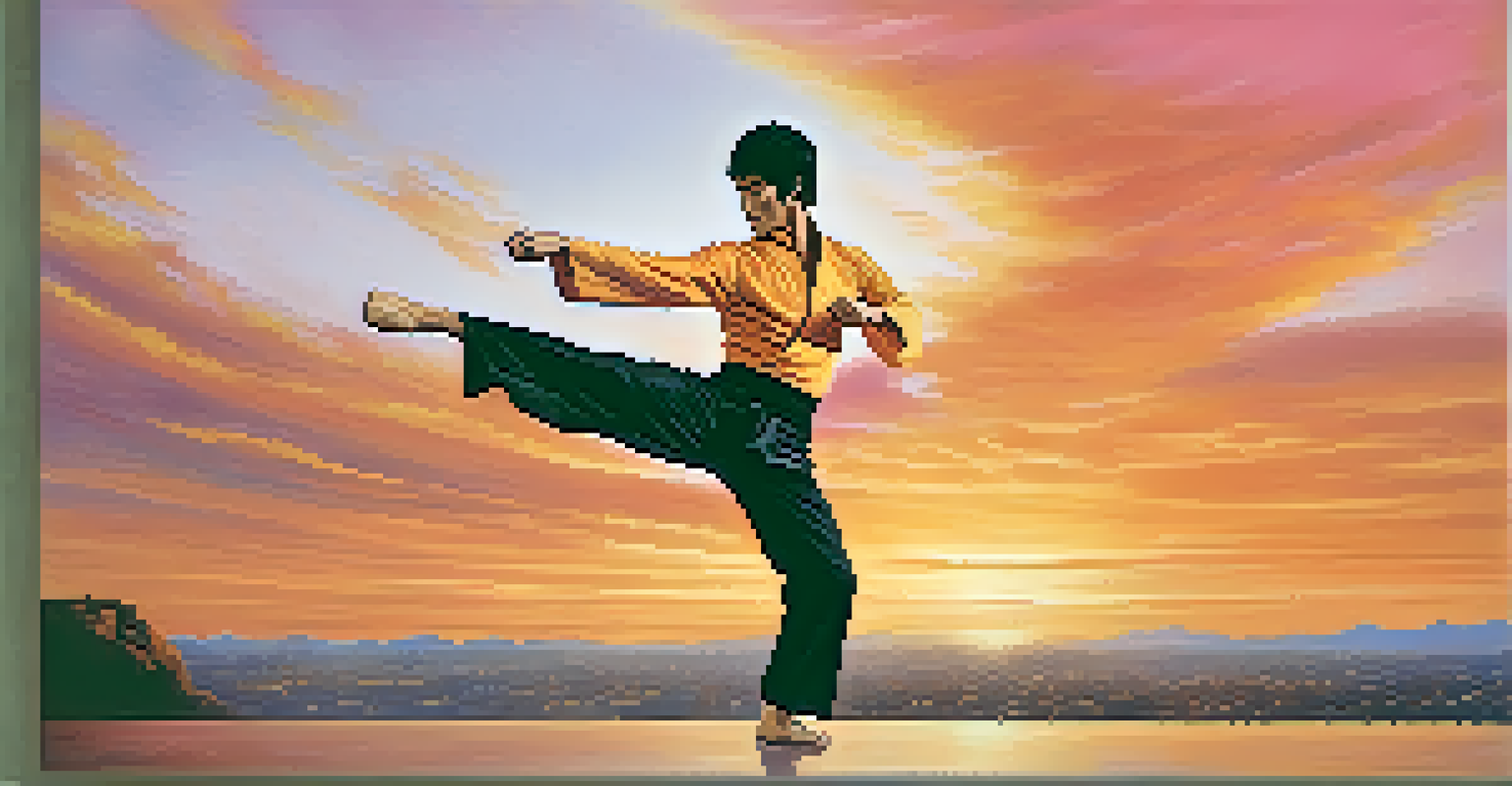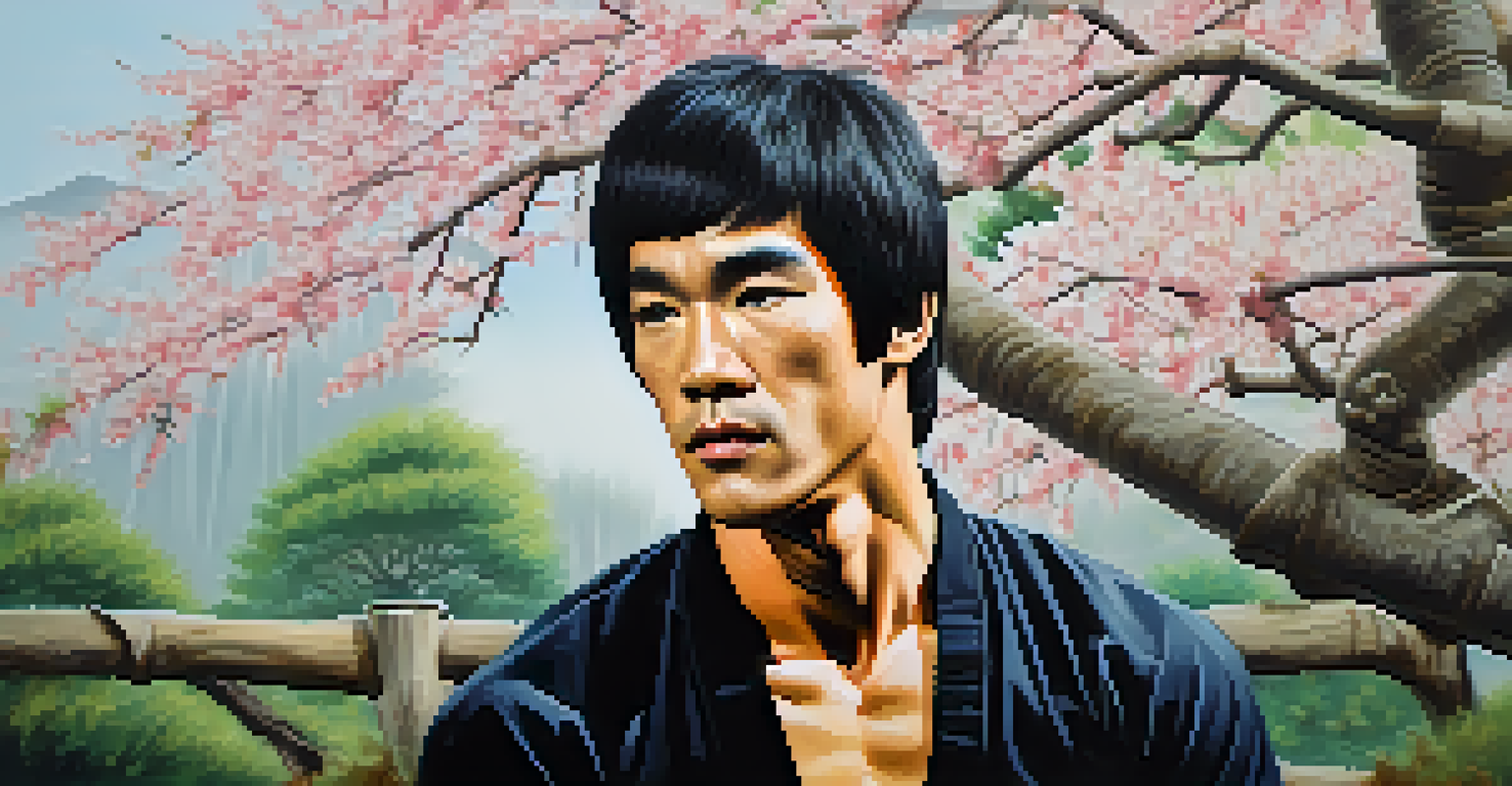Bruce Lee: Revolutionizing Martial Arts and Self Defense

The Early Life of Bruce Lee: A Foundation for Greatness
Bruce Lee was born on November 27, 1940, in San Francisco, California, but raised in Hong Kong. His early exposure to martial arts began at a young age, as he trained in Wing Chun under the legendary Yip Man. This foundation not only taught him the importance of discipline and focus but also ignited a passion that would lead him to revolutionize martial arts.
Absorb what is useful, discard what is not, and add what is uniquely your own.
Lee's childhood experiences, including his struggles with bullying and identity, shaped his philosophy on strength and self-defense. He believed that martial arts should empower individuals, enabling them to defend themselves and gain confidence. These early lessons would become central to his teachings and legacy.
As a teenager, Lee's passion for martial arts only grew stronger, leading him to compete in various tournaments. His unique blend of Western boxing and traditional martial arts began to emerge, setting the stage for his innovative approach that would later captivate audiences worldwide.
The Birth of Jeet Kune Do: A New Philosophy of Martial Arts
In the late 1960s, Bruce Lee founded his own martial arts philosophy known as Jeet Kune Do (JKD). This approach emphasized practicality, efficiency, and directness, breaking away from the rigid structures of traditional martial arts. Lee famously stated, 'Absorb what is useful, discard what is not, and add what is uniquely your own.'

Jeet Kune Do combined elements from various martial arts, such as karate, boxing, and fencing, creating a dynamic system that prioritized real-life application. Lee believed that martial arts should adapt to the individual rather than conforming to a specific style. This philosophy resonated with many, as it encouraged personal growth and self-expression.
Bruce Lee's Martial Arts Revolution
Bruce Lee's development of Jeet Kune Do transformed martial arts by prioritizing practicality and individual expression.
The impact of JKD was profound, as it paved the way for modern mixed martial arts (MMA). Lee's innovative techniques and mindset inspired countless practitioners, proving that martial arts could be fluid and adaptable, a notion that continues to influence martial artists today.
Bruce Lee in Film: Changing Perceptions of Martial Arts
Bruce Lee's charisma and talent on screen played a significant role in popularizing martial arts globally. His films, such as 'Enter the Dragon' and 'The Way of the Dragon,' showcased not only his incredible fighting skills but also his philosophy. These films broke stereotypes and introduced audiences to the depth and artistry of martial arts.
Knowing is not enough; we must apply. Willing is not enough; we must do.
Lee's portrayal of strong, intelligent characters challenged the existing narratives in Hollywood, where Asian characters were often relegated to supporting roles. He became a symbol of empowerment, inspiring people from diverse backgrounds and cultures to embrace martial arts. This shift in representation was crucial in changing perceptions and fostering appreciation for martial arts as a legitimate discipline.
The success of Lee's films also led to an explosion of interest in martial arts, with schools opening up worldwide. His influence transcended cinema, creating a cultural phenomenon that would inspire generations of martial artists and actors alike.
Bruce Lee's Philosophy: More Than Just Fighting
Beyond his physical prowess, Bruce Lee was a philosopher at heart. He believed that martial arts were a pathway to personal development, encouraging practitioners to explore their potential. His writings often reflected this belief, emphasizing the importance of self-awareness and mental strength in tandem with physical skills.
Lee's famous quote, 'Knowing is not enough; we must apply. Willing is not enough; we must do,' encapsulates his approach to life and martial arts. He advocated for an active pursuit of knowledge and self-improvement, urging his students to apply what they learned both in and out of the dojo.
Cinematic Impact on Martial Arts
Through his films, Bruce Lee changed global perceptions of martial arts, elevating it beyond mere fighting to a respected cultural discipline.
This holistic view of martial arts was groundbreaking, as it extended beyond combat techniques. Lee's philosophy continues to inspire those seeking not just to defend themselves but to grow as individuals, making him a lasting icon in both martial arts and personal development.
Bruce Lee's Legacy: An Enduring Impact on Martial Arts
Bruce Lee's legacy endures through the countless martial artists he inspired and the principles he established. His approach to training and self-defense continues to shape modern martial arts practices worldwide. From MMA gyms to traditional dojos, Lee's influence is felt in every corner of the martial arts community.
Many martial artists still incorporate his teachings into their training regimens, emphasizing adaptability and personal expression. The principles of Jeet Kune Do are taught in schools across the globe, reflecting Lee's commitment to innovation and evolution in martial arts.
Moreover, Lee's impact extends beyond martial arts; he is celebrated as a cultural icon who broke barriers and challenged stereotypes. His story continues to inspire new generations, reminding us that with dedication and passion, we can all strive to make our mark on the world.
The Influence of Bruce Lee on Modern Self-Defense Techniques
Bruce Lee's teachings have had a significant impact on modern self-defense techniques, emphasizing practicality and efficiency. His approach encourages individuals to focus on real-world scenarios, making self-defense accessible to everyone. Techniques rooted in Jeet Kune Do have been adopted in various self-defense programs, proving their effectiveness in real-life situations.
Lee's belief in adaptability also resonates with self-defense instructors today, who recognize that every individual may face different challenges. By teaching students to be fluid in their techniques and aware of their surroundings, Lee's philosophy continues to empower people to protect themselves confidently.
Legacy as a Cultural Icon
Bruce Lee's influence transcends martial arts, inspiring resilience and breaking stereotypes for future generations in media and beyond.
Furthermore, the rise of MMA has introduced many to Lee's principles, as fighters integrate techniques from various disciplines. This blending of styles reflects Lee's vision, showcasing the importance of versatility in self-defense and reinforcing his lasting influence on modern combat training.
Bruce Lee's Cultural Impact: A Global Icon
Bruce Lee's cultural impact extends far beyond martial arts; he became a global icon and a symbol of resilience and strength. His story resonates with individuals from all walks of life, inspiring them to overcome obstacles and pursue their passions. Lee's journey from a struggling artist to an international superstar is a testament to the power of determination and hard work.
Lee's influence is also evident in the representation of Asian characters in media. By breaking stereotypes and showcasing the depth of Asian culture, he opened doors for future generations of Asian actors and filmmakers. His legacy continues to inspire those in the entertainment industry to tell authentic stories.

Ultimately, Bruce Lee's cultural significance lies in his ability to unite people through martial arts and personal philosophy. His teachings and life story encourage individuals to challenge societal norms and strive for excellence, making him a timeless figure whose impact will resonate for years to come.